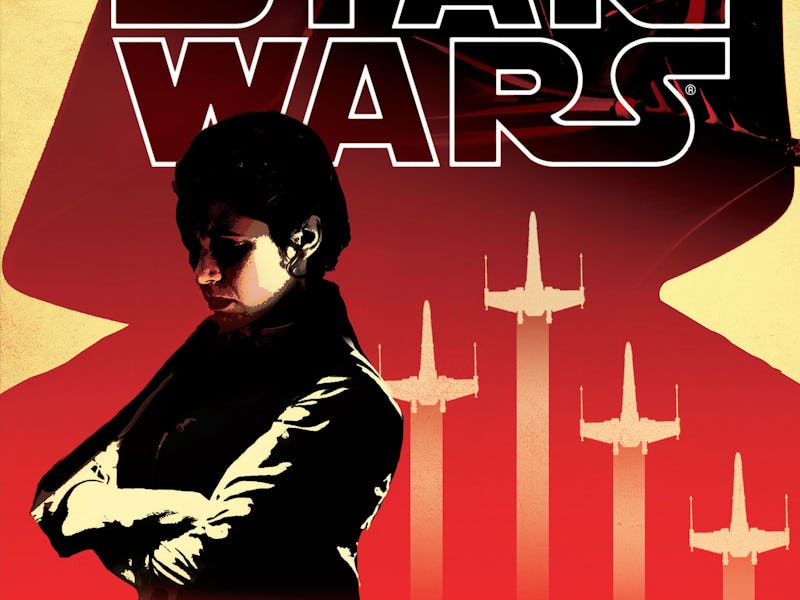'Star Wars: Bloodline' Is the Essential Novel for Any 'Star Wars' Fan
There are no lightsabers, and there are no Jedi -- so what makes 'Star Wars: Bloodline' (out now) so intriguing?

Welcome to the era of the new Expanded Universe.
A lot of folks out there have different definitions for what the “Expanded Universe” means for Star Wars stories. Some reference the classic Legends narrative that kept the franchise running with new stories, games, and comic books for over three decades. Others see it as the growing timeline that reflects upon its Legends roots by opening up the stories of characters that start with Luke Skywalker and end with roles like that of Korr Sella, General Organa’s New Republic liaison who appeared for a whopping three seconds in The Force Awakens.
The new canon, as established by Disney after its purchase of Lucasfilm in 2012, seeks to fill the gigantic shoes that Legends left behind while keeping the ever-growing story of Star Wars as coherent as possible. Under the hand of Lost Stars author Claudia Gray, the story shines as a prime example for adding context to cinematic situations, and adding that classic expansion that fine-tuned, long-time Star Wars fans have come to expect.
Carrie Fisher as General Leia in The Force Awakens
The story tells the tale of a rocky New Republic where weathered war veterans of the Rebellion clash with idealistic leaders in an all-too-familiar manner that hearkens back to the prequels and the Clone Wars: when Padme Amidala Nabierre and Bail Organa (the birthmother and adoptive father of Leia Organa, Bloodline’s protagonist and one of the first women to take charge of her own rescue on screen) first planted the seeds of rebellion against Palpatine’s Empire. Leia, allied with the Populists — a faction that favors self-governing systems and planets — must test her will against senators who ally themselves as Centrists, who believe a sole power must guide the galaxy. In a compromise, the position of First Senator is created, and Leia is faced with a series of challenges after her colleagues pressure her toward the position. It all comes to a dramatic halt when the truth of her parentage comes out, and the shadow of Darth Vader threatens to ruin any path she takes in life.
Claudia Gray made a quick name for herself with last year’s Lost Stars, which explored the original Star Wars trilogy from the perspective of two best friends pitted on either side of the Galactic Civil War. With her incredible knack for creating original characters, Gray arranges a supporting cast that puts Leia in an unfamiliar place for readers. What might be seen as a risky move turns into a wonderful social experiment that is peppered with hints toward Ben Solo’s fall to the dark side. Along with a cast of characters that readers will surely recall during sequel trilogy re-watches for years to come, Leia’s position in the galaxy — and her much-debated path toward politics as opposed to the Jedi way — is explained in such a personal manner that it’s hard not to feel empathetic, and in a sense trapped, right alongside the former teenage galactic heroine.
The greatest challenge of a spoiler-free Bloodline review must be the fact that one new character stands out above the rest,and that is Ransolm Casterfo, the upper class Centrist who serves as Leia’s primary adversary — as well as her greatest ally — on and of throughout the story. Not only is Ransolm a complex character who grows out of terrible habits and places a note of complexity so often overlooked in blockbuster stories when it comes to rivals and allies: that one can exist in between. Couple that with the fact that the incredibly charming young Senator respects Leia’s words (despite her being a direct opponent to his beliefs) and becomes one of the most interesting characters to read (second to Leia) in the novel, and Casterfo quickly becomes a second protagonist that the reader can sympathize with.
One other stand-out character is Lady Carise, who brings to the table the lore of the Elder Houses that Leia is connected to through the Organa family. Materialistic and self-serving, Carise is an intriguing player who moves the story in unexpected ways throughout the book.
Perhaps one of the most wonderfully painful elements of the book rests within Leia’s personal life: tender scenes with her husband, Han Solo, are interrupted with Leia’s anxious thoughts of her son, Ben Solo, and a devastating truth that sets the New Republic on a crash course for failure. Leia’s hard-earned resilience as a leader is constantly tested by the limits of her family secrets throughout the book, and with a timeline cutting so closely to The Force Awakens, events on paper evoke flashbacks (or flash-forwards, as it were) to the saga’s seventh installment, and the pain that permeated throughout the “Organa-Solo” family.
The Force is undeniably strong in Leia, but there are no lightsabers in this story and no Force Ghosts to assist Leia the way her brother once was. Instead, the story is a political thriller that harkens back to the adventures of Leia’s mother, Padme Amidala. With themes of espionage, betrayal and political duress, Bloodline is a non-stop page-turner that grabs at heartstrings that you weren’t aware of and yanks down on every one of them. The story is loaded with context for The Force Awakens that plants the seeds for The First Order in perfectly haunting ways, and leave the reader grasping for more details on newly discovered favorite characters.
You can purchase Star Wars: Bloodline now at your local book store, or on Amazon.